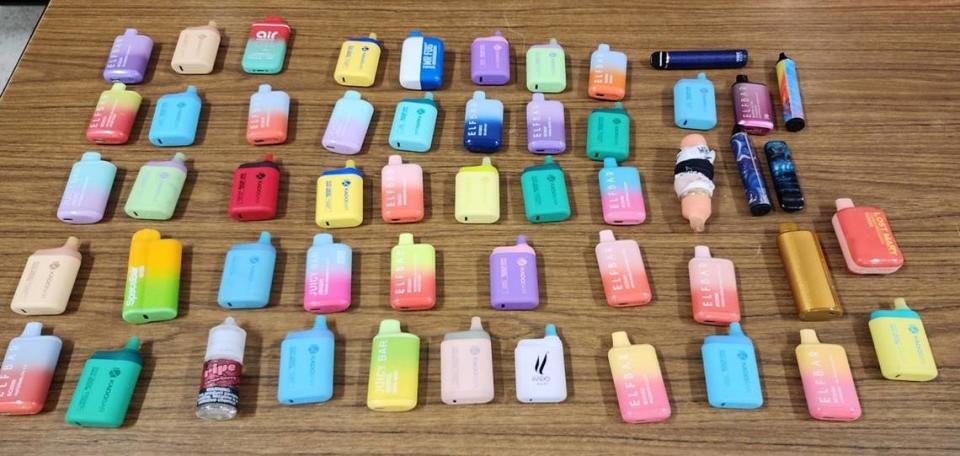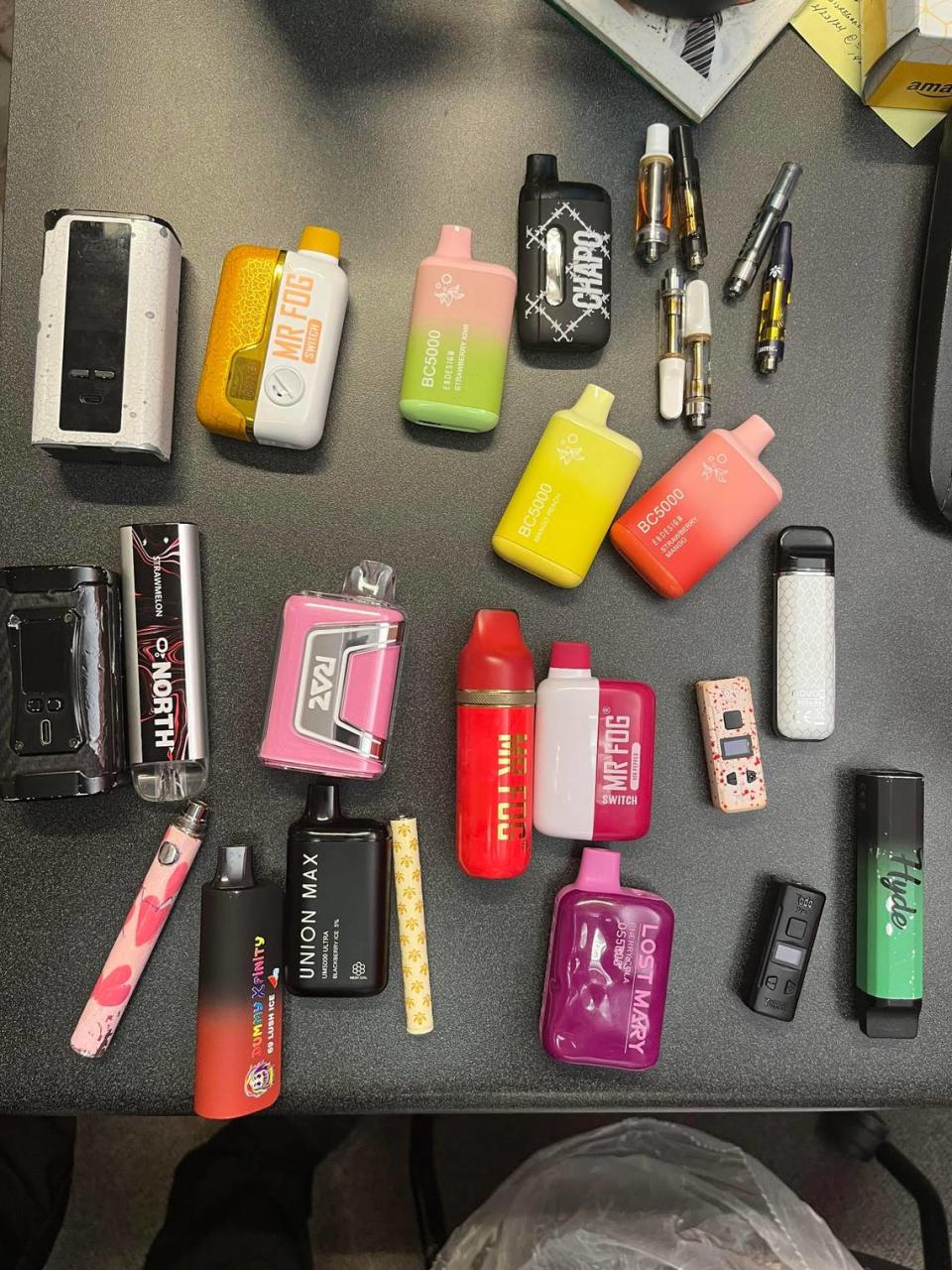KY lawmakers pass ‘watered down’ youth vape bill that exempts tobacco products
To curb youth vaping, state lawmakers sent Gov. Andy Beshear a bill late Thursday that will set new rules for businesses that sell vape products in Kentucky.
However, critics expressed dismay that the bill — originally a crackdown on both tobacco and vape smoking by youths — ended up far weaker after lobbying in Frankfort by tobacco giants Altria and R.J. Reynolds. The companies reported a combined $61,000 in lobbying expenses in the first two months of the legislative session.
“The end result is, there’s not a whole lot of muscle in this bill,” said Terry Brooks, executive director of Kentucky Youth Advocates. “Clearly, the best interest of kids was not the dominant force in this.”
What Kentucky needed was a bill establishing regular inspections of tobacco and vape retailers statewide, based on a comprehensive list of stores, with much stronger penalties for those caught selling to anyone under age 21, Brooks said.
“Each of these pillars just got diluted or watered down as the process went on,” Brooks said.
And vape shop owners warned lawmakers their businesses will be closed by new restrictions on what they can sell. They said the bill favors a handful of electronic smoking devices owned by Big Tobacco, which will clear most of the products off their shelves.

The Herald-Leader reported in December that over a recent 21-month period, state regulators cited at least 114 Kentucky retailers two or more times for selling tobacco and vape products to minors, usually issuing only small fines or warning letters.
House Bill 11 will create a list of businesses selling vape products using corporate data collected by the secretary of state. The list will be given to inspectors with the state Department of Alcoholic Beverage Control, who enforce the law against smoking products being sold to anyone under age 21.
This could plug a loophole in the current enforcement system. Unlike most states, Kentucky does not require tobacco and vape retailers to be licensed, so inspectors don’t know where all of the stores are located.
But an earlier version of the bill also would have listed tobacco retailers, not just vape retailers.
Sign up for our Bluegrass Politics Newsletter
A must-read newsletter for political junkies across the Bluegrass State with reporting and analysis from the Lexington Herald-Leader. Never miss a story! Sign up for our Bluegrass Politics newsletter to connect with our reporting team and get behind-the-scenes insights, plus previews of the biggest stories.
The bill sets tougher penalties for retailers who sell vape products to anyone under age 21, with fines up to $500 for a first offense; $1,000 for a second offense and $5,000 for a third offense.
Four offenses in a two-year period will put retailers in a publicly posted “noncompliance database,” and they will be banned from selling vape products for the next year.
But the earlier version of the bill proposed even bigger fines, and it would have extended those fines to retailers who sold tobacco products to minors, not just vape products. Instead, the bill that lawmakers passed says retailers who sell tobacco to minors will face the current, weaker fine structure of only $100 to $1,000.
Finally, the bill limits Kentucky retailers to vape products that have been approved or exempted for sale by the U.S. Food and Drug Administration.
In 2016, the FDA designated vape products to be tobacco products, just like cigarettes, and therefore subject to its regulatory power under the federal Tobacco Control Act. The FDA said manufacturers must apply for its approval in order to continue selling vape products.
However, the FDA so far has rejected more than a million vape product applications and approved only 23. That has been controversial.
A federal appeals court in New Orleans criticized the FDA’s approval process as arbitrary and capricious in January, ruling for the makers of flavored liquids for vape products who submitted applications.
Owners of Kentucky vape stores warned lawmakers during the session that limiting them to FDA-authorized products will wipe out most of their stock and force them to close, eliminating thousands of jobs.
As it happens, they said, the 23 vape products currently authorized by the FDA are owned by three Big Tobacco giants: Altria, R.J. Reynolds and Japan Tobacco International.
Troy LeBlanc, a vape retailer and leader in the Kentucky Smoke Free Association, testified to the Senate Judiciary Committee Thursday that only a few vape products would survive enactment of House Bill 11, such as Juul, which was once owned in part by Altria.
“We simply can’t compete as vape stores having the same 15, 20 products as every gas station,” LeBlanc said.
“By far, vape stores have the lowest number of selling to under-aged people, as reported by the FDA in 2023,” LeBlanc added. “And all those stores are going to go out of business, and the No. 1 bad actor, which is gas stations and convenience stores, are now going to sell Juuls all over the state.”

The compromise legislation the General Assembly passed was a combination of HB 11, sponsored by Rep. Rebecca Raymer, R-Morgantown, and parts of Senate Bill 344, sponsored by Sen. Brandon Storm, R-London.
Raymer and Storm told their colleagues that Kentucky school children are getting their hands on dangerous vape products made in China and not authorized for use in the United States. Lawmakers must get those products off the market, they said.
“This is an issue about China or children. Make your decision,” Storm said at Thursday’s committee hearing.
Raymer said her bill is meant to help Kentucky regulators enforce the state and federal laws already on the books.
“We are not making anything illegal,” Raymer said. “We are simply following what the FDA has already put in place.”
It’s illegal to sell tobacco and vape products to minors. Many KY stores do it anyway
KY lawmakers take aim at stores that illegally sell vapes and cigarettes to kids

